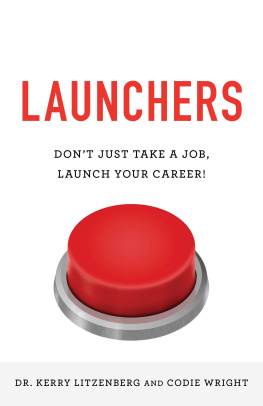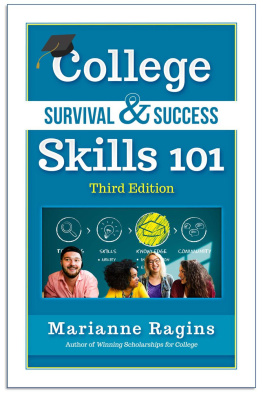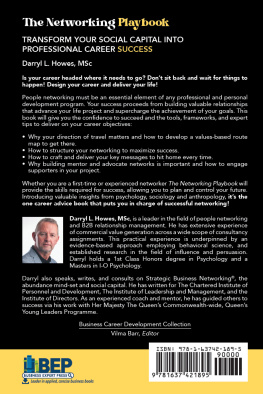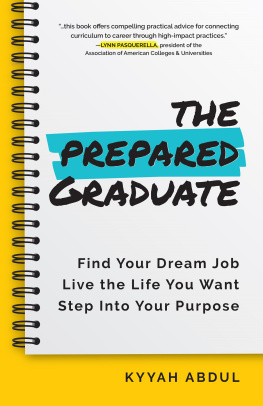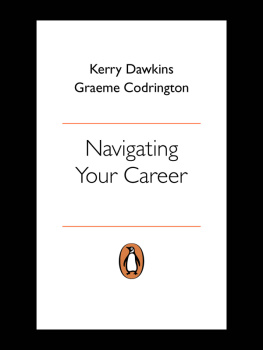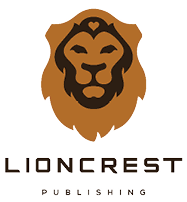Copyright 2019 Kerry K. Litzenberg & Codie J. Wright
All rights reserved.
Dr. Kerry Litzenberg: I dedicate this book to my wife, Sandy, my three daughters, Karen, Jane, and Sara, and to my fabulous sons - in - law , Jimmy and Matt, as well as the truly outstanding grandchildren they have produced, Riley, Trey, Kennedy, Reed, and Reece. These people have been a true blessing in my life.
Codie Wright: I dedicate this book to my mom for teaching me the importance of a strong work ethic, and to my father, who taught me how to have the biggest heart.
Together, we would like to dedicate this book, as well as our careers, to the many young people weve had the privilege of helping launch their professional careers.
Finally, we dedicate our lives to our Lord and Savior, Jesus Christ.
Introduction
How to Use This Book, Why We Wrote It, and Who Its For
You are about to make the most exciting decision of your entire life: to launch your career.
Meet Sam, a twenty - two - year - old who majored in business at a top - tier university. Over the course of four years, Sam took a wide variety of marketing, management, and business classes geared toward a degree plan for his major. He was involved in several organizations and volunteer activities, earned a 3.2 GPA, and had a part - time job during school to earn a little extra income.
When he first entered college, Sams goal was to earn a degree in biomedical science and then attend medical school. After countless hours of study and poor test scores, he realized that chemistry and biology were not a good fit, so he decided to switch to a business degree. A business degree will provide a wide range of opportunities, he thought, so why dont I check out that option?
Sam was an excellent candidate for a marketing or management position, but there was one problem: he didnt know which industry or company was the best fit for his career. While meandering through the universitys business career fair one day, he stumbled upon a software company that seemed somewhat interesting, so he applied and was offered a position.
Sam took the job and worked for the company for several years, but decided it wasnt a good cultural fit for him. He left for a better job in a different industry, where he stayed for several more years, before he decided it wasnt better after all. This same vicious cycle continued for the next five years, until Sam eventually accepted a position in the medical industry. Will it finally be a good fit for him? Time will tell.
Does this cycle sound familiar? Does it remind you of anyone you know?
If this situation stresses you out, youre not alone. Many people between the ages of twenty - one and thirty - five are feeling anxious about the process of preparing for their career launch. You may be one of them. Maybe you feel like you dont have enough time to prepare. Maybe no one has ever shared with you the process for launching yourself into the next three or four decades of your life.
Let us put your mind at ease. Theres no reason to worry. With the right plan in place, a clear sense of what you have to offer, and an understanding of the context of your career space, you can launch yourself into your career with clarity and purpose. However, its a major effort, so we encourage you to start your launch now. The last thing we want is for you to just take a job and wind up feeling miserable. Become a Launcherthats what we call people who have begun this processand start preparing for a satisfying and fulfilling career now.
We work primarily with college students, and were always amazed to meet people who will work for four or five years in college learning about supporting subjects for their major, but then spend no time preparing for the actual career launch. In fact, many college students wait until they graduate and then simply start looking for a job with no plan in place. There seems to be an assumption that somehow the pieces will fall into place on their own, but it doesnt work that way. If you dont create a calculated career launch, you will end up job hunting and most likely take the first job that comes along. You might have four to five jobs in the next five years that you dont like while you wait for the right one.
Think of your career launch like the space program. When NASA wants to launch the latest communications satellite into space, they discuss, test, and develop a plan for months, possibly years, before they finally push the launch button on the rocket that will take the satellite into space.
The launch itself lasts a matter of minutes, and getting the satellite into orbit might take two hours. It all happens so quickly that it can seem sudden to outside observers who dont necessarily see the careful thought and planning that went into making sure the launch was a success, but it was the planning that made it possible. Remember, even though the launch happened quickly, that satellite is going to orbit the earth for many years, which is why all of the planning and preparation are well worth it.
Thats what a career launch is like under the best of circumstances. Plan, plan, plan, then push the launch button and hope for a successful launch.
A Changing Focus
In high school and the early college years, maybe you were like most studentsfocused on your studies and extracurricular activities. You worried about grades, your SAT, LSAT, GRE, or GMAT scores, and you just hoped your career would unfold naturally along the way.
Friends and family have asked you from a young age, What are you going to be when you grow up? Thats an easy question to ask, but maybe no one has ever shown you how to realize your best answer to that question.
When you applied to college, your immediate concern was selecting a major. However, we tend to find that students select a major based on how well they performed in a certain subject or extracurricular activity during high school. I aced my English classes, they might think, so maybe I should major in English. Sometimes, they choose a major based on a general interest in a subject: I love animals, so maybe Ill be a veterinarian.
However, the selection of a college major might not match well with a long - term career plan. In fact, some of the majors that are frequently chosen dont readily lend themselves to career options. Psychology is a common undergraduate major, but unless a student continues their education into the graduate level, a psychology degree wont open up many doors other than clinical psychology.
In our experience, many college professors know very little about the relevance of their curriculum in finding a career. Thats not really their job anyway, but this is where many students falter. They spend a hundred thousand dollars learning English or chemistry or some other subject; by the end, theyve learned almost nothing about how to use that knowledge and the skills theyve gained to launch a career in a relevant industry that matters to them.
Were not faulting the university system. A degree program promises to teach students particular subjects, and thats what it does. When students come to the end of their degree program, they might be handed over to a career center, but career centers often have very few contacts or experience in specific industry career paths. If you go there as an English major, they will help you with your rsum but, more than likely, they wont have industry connections to help you find a specific job opportunity.

